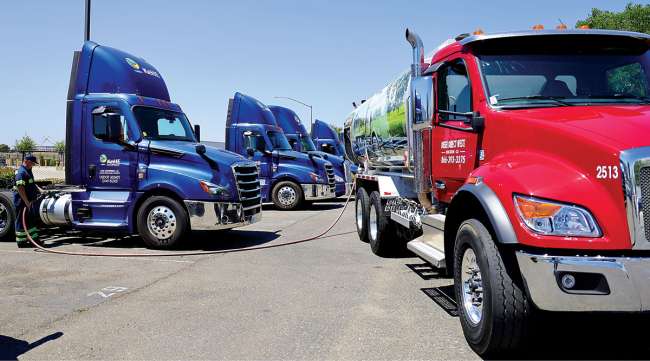The U.S. trucking industry is increasingly adopting renewable diesel due to its environmental benefits, including lower carbon dioxide and nitrogen oxide emissions compared to regular diesel. Renewable diesel reduces carbon intensity by an average of 65%, offering significant maintenance cost savings for fleet operators. Diesel Direct, a major distributor, reports that using renewable diesel has eliminated issues with diesel particulate filters and exhaust gas recirculation valves, further lowering maintenance costs.
Renewable diesel, also known as green diesel, meets the American Society for Testing and Materials D975 specification for petroleum diesel. It is produced by hydrotreating feedstocks such as used cooking oil, which involves reacting the feedstock with hydrogen under high temperatures and pressures. The number of renewable diesel plants in the U.S. has grown, with many converted from petroleum refineries. Neste, a Finnish company, is a significant producer, collaborating with Marathon Petroleum to convert a California refinery.
The fuel growth in the U.S. depends on supportive policies and legislation, particularly state-level clean fuel programs. California leads the nation in renewable diesel usage, followed by Oregon and Washington. New Mexico is also developing a Clean Transportation Fuel Standard. Companies like Titan Freight Systems report substantial maintenance savings and reduced emissions using renewable diesel.
Hydrotreated Vegetable Oil (HVO), a type of renewable diesel, is seen as a promising replacement for ultra-low-sulfur petroleum diesel. Volvo Trucks North America has started using HVO in newly assembled trucks to reduce emissions. Industry experts emphasize the need to educate the public and potential users about renewable diesel's benefits and differences from biodiesel. Other feedstocks, such as regional waste, also show potential for renewable diesel production.
Bullet Points:
- The U.S. trucking industry is adopting renewable diesel for its lower emissions and environmental benefits.
- Renewable diesel reduces carbon intensity by an average of 65% compared to regular diesel.
- Diesel Direct reports maintenance cost savings and reduced issues with diesel particulate filters and exhaust gas recirculation valves.
- Renewable diesel meets the ASTM D975 specification for petroleum diesel and is produced by hydrotreating feedstocks.
- The number of renewable diesel plants in the U.S. is growing, with many converted from petroleum refineries.
- Neste, a Finnish company, is a major producer, partnering with Marathon Petroleum to convert a California refinery.
- The growth of renewable diesel in the U.S. relies on supportive state policies and clean fuel programs, with California leading the way.
- New Mexico is developing a Clean Transportation Fuel Standard to encourage low-carbon fuels.
- Titan Freight Systems reports maintenance savings and reduced emissions using renewable diesel.
- Hydrotreated Vegetable Oil (HVO) is a promising renewable diesel replacement for ultra-low-sulfur petroleum diesel.
- Volvo Trucks North America uses HVO in new trucks to reduce emissions.
- Industry experts emphasize the importance of educating about renewable diesel's benefits and differences from biodiesel.
- Regional waste, such as wood residuals and garbage, shows potential as feedstock for renewable diesel.
- The North American Council for Freight Efficiency discusses multiple powertrain options for the future of decarbonizing heavy-duty trucking.
